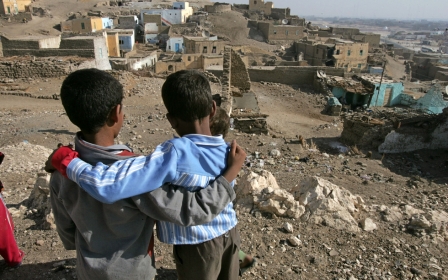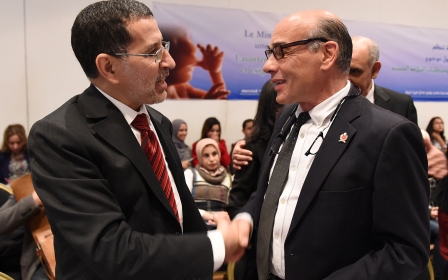Algeria: Feminists rally against domestic violence
Nadia woke up groggy from a nap when she met with Middle East Eye in her darkened room, with brown Venetian blinds remaining closed in the middle of the afternoon. The decoration of her bedroom isn’t particularly personal, except for two impressive photographs embellishing a bedside table.
“This is my son and my daughter; they are both married. They don’t know that I’m here. Nobody knows,” Nadia told MEE.
For the past three months, the 53-year-old former civil servant has been living in the cosy shelter of SOS Women in Distress, a non-profit organisation, constructed in the centre of Algeria’s capital.
Nadia will never forget the day she left her husband. After 32 years of an abusive relationship, she left her house with her belongings in two suitcases. She didn’t tell anybody about her decision out of fear that her husband would come after her. He had abused her physically and emotionally for years, she said.
“He was rude, irritable and sometimes hysterical. I waited till I retired to escape,” Nadia remembered.
Since then, her life has been on hold. Every day, with little exception, she sticks to the same routine: she wakes up in the early morning, cooks, cleans her room and the kitchen and then sleeps. “There is not much to do in the shelter," she said, "but at least I feel secure.”
Nadia still hopes that her stay will be temporary, even if she knows perfectly well that she has little chance to rent an apartment. “Housing is outrageously expensive in Algiers and few owners tolerate single ladies,” she explained.
Nadia’s experience is not unique. Home is not a safe place for thousands of Algerian women. Last year, the judicial police registered about 7,000 complaints ofdomestic violence. Some women are even beaten to death. Between 100 and 200 women die every year because of violent abuse, the judicial police indicated.
Those figures don’t reflect the full reality though, experts say. “Nobody knows exactly how many women suffer from domestic violence since most of the victims are too afraid to speak out. According to the Minister of Women’s Affairs’ prevalent survey, released in 2006, one woman out of seven is affected. In 75 percent of the cases, the aggression is committed by the husband. The older brother, is the second most common perpetrator. The age of battered women usually ranges from 17 to 50 years old, according to Nadia Ait Zai, a lawyer and founder of CIDDEF, a women's empowerment organisation.
Why do battered women stay trapped in abusive relationships? “Because they have nowhere to go. After fleeing, they face an arduous journey,” Ait Zai answered. Some choose to stay in an abusive relationship out of fear of ending up on the streets as the number of available beds in shelters still falls short of the need, she added.
Shelters like jails
In Algeria, eight shelters welcome victims of abusive relationships, out of which five are located in Algiers. In the state-owned refuges, the rules are exceedingly strict: women are not allowed to go outside alone at all, nor to have a cell phone, and every time they need to go out, they are escorted.
“It looks like a jail. Those women need to be treated with the respect they didn’t get at home. But there, they continue to feel squashed and oppressed,” Sofiane, a former project manager in a refuge, told MEE.
“Conditions of living are way better in shelters run by non-profit organisations. But in those places, beds remain unoccupied,” he added.
Nadia’s refuge is a charming wooden cottage equipped with a balcony and a playground that overlooks Algiers’ bay. In the last days of summer, the refuge is unexpectedly quiet. Only four women, including Nadia, reside there. On the first floor, Meriem Belaala, the residential services director, is sitting behind her desk, buried with piles of documents and boxes. She explained: “There is a process that candidates need to go through. The shelter was built to host 16 women, but we used to welcome dozens of people. As we couldn’t manage to take care of every resident, we have recently decided to guarantee housing to a maximum of 10 people."
Beyond a roof over their heads, vulnerable women have special needs. Foremost, they want to keep their identity and whereabouts kept secret for security reasons.
“Most of the transitional and permanent housing is easily accessible and doesn't include a security safeguard. Who would protect a battered woman from a vengeful husband?” said Dalila Hadjila, a spokesperson at the Algerian League for Human Rights (LADDH).
The shame attached to denouncing an abusive husband remains a major obstacle.
“They believe that if they accuse their husband of beating them they will cause the destruction of their family," said Fatma Oussedik, a senior professor of sociology at the University of Algiers and founder of Reseau Wassila, an organisation that provides assistance to vulnerable women.
Others remain silent because they are discouraged from reporting the crimes. “It isn’t rare to hear a policeman persuading a battered woman to go back to her house instead of registering her complaint,” Hadjila told MEE, deploring what she called a “culture of victim-blaming”.
“The first time I went to a police station, the officer told me that I should go back home and make up with my husband. The second time I tried to leave him, he corrupted the judge,” Hasna* told MEE, while she looked after her five children. Hasna finally managed to get away from him a year ago. “We stayed three months with the same clothes. I sold all my jewellery to support my children and pay the lawyer,” she said.
Domesic abuse not illegal
Algeria is among the 20 states in the world that has yet to outlaw domestic violence against women. The situation may change though. With abuse levels at epidemic rates, the government has recently been willing to tackle gender-based violence and reform the penal code. Last March, three days before International Women’s Day, the National Assembly passed an act banning domestic violence against women. Under the terms of the law, an abusive husband can be punished by up to 20 years in prison, depending on his wife’s injuries, and face a life sentence for attacks resulting in death.
Five months after the harshly contested vote in the assembly however, and the second chamber has yet to vote on the reform. “The implementation should have been a formality as the law is a presidential initiative. We tried to reach members of the FLN [the ruling party] but everybody remains silent,” Tinhinane Makaci, a member of Tharwa Fadhma Nsoumer, a feminist association, told MEE.
The struggle against domestic violence is not the top priority of the government, activists say. “The vote at the National Council has been postponed amid the clashes in Ghardaia, the debate over the oil price crisis, and recent celebrations during the holy month of Ramadan,” Hassina Oussedik, head of Amnesty International Algeria, told MEE.
In August, Amnesty International Algeria published an electronic petition in an effort to encourage the senators to vote for the law. Over 3,000 people signed it. “We sent a copy to Prime Minister Abdelmalek Sellal but we haven’t received any answer from him. However, we were told that the law will be examined by the end of the year,” Hassina said.
Some senators doubt that the bill will pass soon. “The text is in the president of the National Council’s office, and, because of the conservative lobbying, is not likely to be examined,” said Mohand Ikhabane, a Rally for Culture and Democracy (RCD) MP.
Increasing criminal penalties will not be enough to curb domestic violence, experts say. “The government should not only pass a law criminalising domestic violence against women - it should also release better education programmes, teaching the young population about respectful relationships,” Ait Zai said.
Archaic 'Family Code'
Activists have also called for a campaign of awareness to let people know about the reform. “The law will have no impact if the people don’t hear about it. Some battered women are not even aware that they are victims,” Hadjila said.
“Algerian society is macho like the rest of the Mediterranean countries. Gender-based violence is rooted in a culture of discrimination against women, fuelled by both the family code and Islamist propaganda channels."
The government approach may fail if the family code is not abolished, feminists affirm.
“We won’t change the way the men think and their attitude towards women without repealing the Family Code, which is an archaic and rigid Sharia-inspired corpus of laws, allowing any husband to repudiate his wife. That holds us back,” Yasmina Chouaki, founder of Tharwa Fadhma Nsoumer, told MEE.
“If the law banning domestic violence is enforced, it will be a symbolic victory. We need it so as to not give up on our rights. But the law is a means not an end in itself,” Makaci concluded.
*Her name was changed as she wishes to remain anonymous
New MEE newsletter: Jerusalem Dispatch
Sign up to get the latest insights and analysis on Israel-Palestine, alongside Turkey Unpacked and other MEE newsletters
Middle East Eye delivers independent and unrivalled coverage and analysis of the Middle East, North Africa and beyond. To learn more about republishing this content and the associated fees, please fill out this form. More about MEE can be found here.




